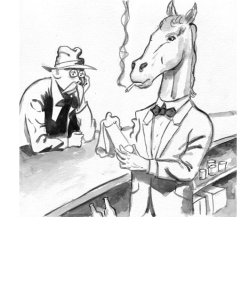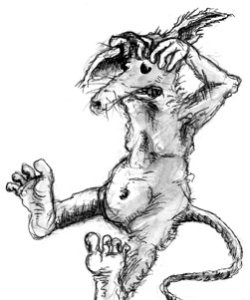The Contester: The Collapse of Neil Azevedo's Zoo

Two years after the failure of Zoo Press's fiction contests in 2004, founder Neil Azevedo responds about more controversy surrounding its poetry contests.
Jump to navigation Skip to content
Articles from Poet & Writers Magazine include material from the print edition plus exclusive online-only material.

Two years after the failure of Zoo Press's fiction contests in 2004, founder Neil Azevedo responds about more controversy surrounding its poetry contests.
This installment of Page One features excerpts from A Strange Commonplace by Gilbert Sorrentino, Genealogy by Maud Casey, and Visigoth by Gary Amdahl.
Sadly, recent revelations are forcing readers—confronted by a brand-new band of literary scallywags, hucksters, and hoaxers—to reconsider the veracity of the story as well as that of the storyteller.

On the eve of her departure from Somerville, Massachusetts, for Iowa City, Lan Samantha Chang spoke about her new role as the leader of the country's oldest creative writing program.
Literary MagNet chronicles the start-ups and closures, successes and failures, anniversaries and accolades, changes of editorship and special issues—in short, the news and trends—of literary magazines in America. This issue's MagNet features Fairy Tale Review, Alimentum, Lost, Dislocate, Tameme, Double Change, Storie, and Terra Incognita.
In response to its 2004 report "Reading at Risk," which found that significantly fewer people read serious literature now than in years past, the National Endowment for the Arts recently launched an ambitious program designed to reverse the trend.
Small Press Points highlights the happenings of the small press players. This issue features Hourglass Books, Hanging Loose Press, and Chiasmus Press.

Among the many poetry collections that have been published in the weeks leading up to National Poetry Month, Jim and Dave Defeat the Masked Man, a collaborative book of sestinas by James Cummins and David Lehman released by Soft Skull Press in February, features perhaps the most prestigious and, simultaneously, zany cast of characters to appear in a book of poems since Alan Kaufman's Outlaw Bible of American Poetry was published by Thunder's Mouth Press seven years ago.
In celebration of National Poetry Month, we present this all-poetry edition of Page One, featuring excerpts from Black Lab by David Young and Drive: The First Quartet by Lorna Dee Cervante.

It used to be that when a writer bestowed human qualities on an animal—the ability to speak, for instance—it almost always meant trouble. Today, animal lit is broader in scope and occasionally even benevolent in nature.

In an effort to promote scientific literacy, foster an appreciation of the humanities, and encourage readers to make "informed and imaginative connections" between the sciences and the arts, New York City–based Vernacular Press recently launched a series of books titled "Categories."
In the second half of the twentieth century, a number of poets’ theater programs, including the Poets’ Theatre, which was established in Cambridge, Massachusetts, in 1950, and staged plays by John Ashbery, James Merrill, Frank O’Hara, and Richard Wilbur, provided venues for work written by poets for the stage. Now, a new generation of poets’ theater programs are raising their curtains for plays by poets.
This installment of Page One features excerpts from Parallel Play by Stephen Burt and The Thin Place by Kathryn Davis.
Can political fiction matter? Stephen Elliott, the editor of Politically Inspired, an anthology published by MacAdam/Cage in 2003, and its follow-up, Stumbling and Raging: More Politically Inspired Fiction, published by MacAdam/Cage this month, casts his vote in the “definitely yes” column.
For those who don’t mind Hollywood versions of great literature, a new series of novels packaged with the DVD recordings of the films they inspired allows for a side-by-side comparison.
Literary MagNet chronicles the start-ups and closures, successes and failures, anniversaries and accolades, changes of editorship and special issues—in short, the news and trends—of literary magazines in America. This issue's MagNet features the Paris Review, A Public Space, lyric, Saranac Review, Spoon River Poetry Review, Red River Review, the Canary, and River Styx.
Joining the ranks of literary contests that have failed to yield a winner, Winnow Press is the latest sponsor to announce that the manuscripts received for their First Book Award were not up to par; they are, however, offering something of a consolation prize.
Small Press Points highlights the happenings of the small press players. This issue features Action Books, Fence Books, Verse Press, Wave Books, Tin House Books, Bloomsbury USA, Twisted Spoon Press, and White Pine Press.
The University of Georgia Press recently revoked the 2004 Flannery O’Connor Award for Short Fiction given to Brad Vice of Starkville, Mississippi, for his short story collection, The Bear Bryant Funeral Train, which was published in September 2005, after learning that one of the stories contained uncredited material from Carl Carmer’s Stars Fell on Alabama, a book of nonfiction published by Farrar & Rinehart in 1934 and later reprinted by the University of Alabama Press.
At the end of his fourth week on the job as the book editor of the Los Angeles Times, Ulin spoke about his intentions for the Book Review and his responsibilities as its new editor.

Images from a new collection of graphic art by Chip Kidd, an associate art director at Knopf, who has designed nearly eight hundred book jackets for the publishing house during the last twenty years.
During a recent trip to New York City, Joseph Bednarik, the marketing director of Copper Canyon Press, noticed something while riding the subway that got him thinking about the ways in which poetry is distributed.
Page One features a sample of titles we think you'll want to explore. With this installment, we offer excerpts from The Jungle Law by Victoria Vinton and Mother’s Milk by Edward St. Aubyn.

As long as there has been war, there have been writers trying to understand it, turning battlefield horrors into narrative, trying to make something useful out of its debris, but in recent months an unusually high number of soldier memoirs have been released by American publishers.
Literary MagNet chronicles the start-ups and closures, successes and failures, anniversaries and accolades, changes of editorship and special issues—in short, the news and trends—of literary magazines in America. This issue's MagNet features Poetry Northwest, the Alaska Quarterly Review, Fence, Black Clock, Ninth Letter, and Eleven Eleven.